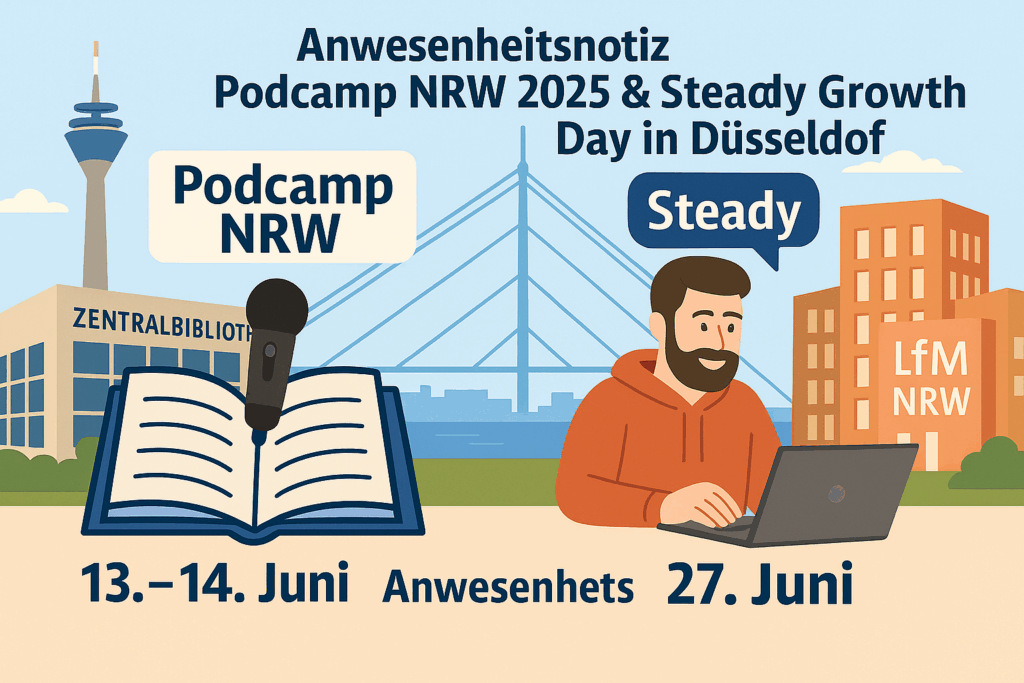This is a bonus blog post for this weeks issue of my newsletter Style & Stitches, where we analyze the public discourse about the development of social platforms like X, Threads, Bluesky and Mastodon.
Here are the notes of the five most important sessions. Happy deep diving!

The session titled „Machtfaktor Social Media – gestern war der beste Tag, mit Regulierung die Demokratie zu bewahren“ (The Power Factor Social Media – Yesterday was the best day to preserve democracy through regulation), featuring Chan-jo Jun and Jessica Flint, critically examined how social media platforms, once seen as neutral advertising channels, are now actively seeking political influence. The discussion highlighted Europe’s decade-long struggle to effectively regulate these platforms, consistently lagging behind their rapid evolution. The urgent tone of this session reflects a profound and critical public sentiment concerning the unchecked power and governance failures of centralized social media platforms, particularly X. The focus on regulation and democracy implicitly advocates for platforms that are either inherently more transparent and accountable, such as decentralized models, or more amenable to public interest oversight. This session underscores a strong desire within the re:publica community for a fundamental shift in how social media operates, moving towards models that prioritize democratic values over commercial or political influence.
In contrast, the „Fediverse-Meetup – Celebration of the Fediverse“ session was explicitly designed to „celebrate the existence of the Fediverse“ and foster networking among attendees, even those unfamiliar with the concept. Speakers Henning Krause and Melanie Bartos encouraged participants to engage with the Fediverse (Mastodon’s ecosystem) and demonstrate its enjoyable aspects. The „celebration“ aspect of this meetup signifies a strong, positive sentiment and growing enthusiasm for the Fediverse within the re:publica community. This directly addresses Mastodon’s perceived „steep learning curve“ by actively inviting and onboarding newcomers, suggesting a concerted effort to expand its reach among digitally literate individuals. This session represents a significant qualitative endorsement of Mastodon’s community-driven and decentralized model, highlighting its perceived effectiveness in fostering positive, user-controlled online spaces.
A direct and public indictment of X’s performance under its new ownership was evident in the session „Klimadesinformation auf X/Twitter – Welchen Einfluss hatte die Übernahme von Elon Musk“ (Climate Disinformation on X/Twitter – What Influence Did Elon Musk’s Takeover Have), presented by Fiete Stegers. This talk specifically investigated changes in German-speaking climate discourse on X following Elon Musk’s acquisition, aiming to determine if platform changes led to an increase in climate disinformation. The explicit focus on „disinformation“ highlights a major concern among the re:publica audience and experts, reinforcing the narrative of X as a problematic platform that has deteriorated in its capacity as a reliable public sphere. The very inclusion of such a dedicated, critical session within the re:publica program serves as a powerful negative public perception regarding X’s current state and its impact on critical societal discourse.
Technologist Robin Berjon, a custodian of Free Our Feeds, delivered a talk titled „How We Can Finally Make The Digital World Democratic: Starting With Social Media,“ arguing that the internet’s „authoritarian nature“ is unsustainable, especially as it functions as critical infrastructure.29 He advocated for the use of open protocols and „pro-democracy technical architectures“ to build genuinely democratic social media platforms. This session provides a robust theoretical and ethical justification for the appeal of decentralized alternatives like Mastodon and Bluesky. It frames these platforms not merely as alternatives but as essential models for realizing a more democratic digital future. The emphasis on „open protocols“ directly aligns with the foundational principles of ActivityPub (Mastodon) and ATProto (Bluesky), indicating a significant qualitative endorsement of these architectural approaches at re:publica as superior in terms of democratic values.
Finally, media psychologist Sabine Trepte, in her session „Social Media, Social Supermarkets – GenXYZ, Materialismus und soziale Medien,“ discussed how social media increasingly functions as „social supermarkets,“ driving consumption and materialism across generations. She called for „a lot more platform regulation and a little less greed“, with her research focusing on identity, privacy, social support, and knowledge acquisition in social media. This session broadens the critique beyond X’s specific governance issues to the fundamental business models of many mainstream, ad-driven social platforms. The characterization of social media as „social supermarkets“ and the call for „less greed“ reflects a deep-seated dissatisfaction with the commercial imperatives that often override user well-being and public interest. This indirectly but strongly supports the ad-free and privacy-focused models of Mastodon and Bluesky, suggesting a positive public perception for platforms that resist the pervasive consumerism and data monetization of the dominant players.






Schreibe einen Kommentar